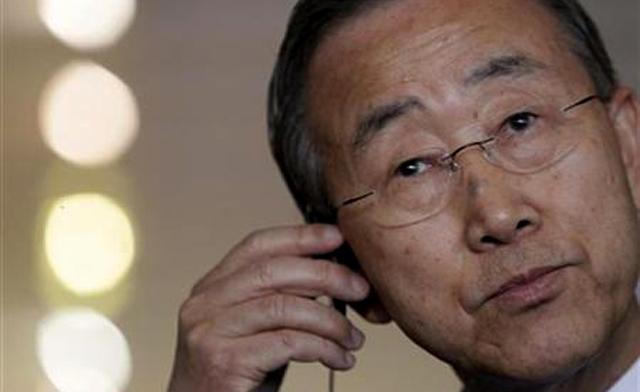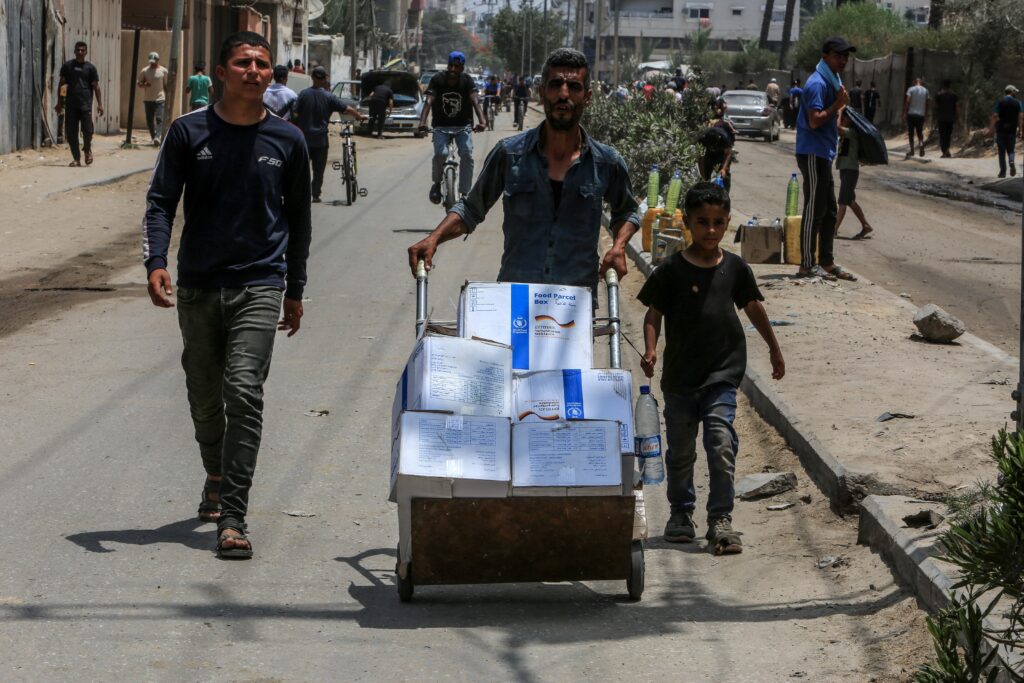UPDATES
Syria burns as the UN turns its gaze to Israel
August 28, 2013 | Daniel Meyerowitz-Katz

Daniel Meyerowitz-Katz
As everyone digests the harrowing reports of nerve gas being used by the Syrian regime against its own people, and the US boosts its military posturing, one story that has seemingly been pushed to the side is the increasing irrelevance of the United Nations.
The signs of this are many. For one, the Obama Administration has reportedly postponed a meeting with Russia in order to work on the Syria issue. It speaks volumes that the Americans would sooner handle the issue alone than deal with the other permanent members of the UN Security Council (‘SC’). France too has been indicating a desire to bypass the SC, where they know that any positive moves would likely be blocked by Russia and China.
After more than two years of dithering as Syria burns, the SC has patently failed in its mission to maintain international peace and security. Indeed, the UN as a whole seems to have done nothing useful except observe and document Syrian atrocities a step behind the world’s press. As British Foreign Secretary William Hague put it, the UN has not “shouldered its responsibilities”.
At the same time, UN activity has been continuing unabated over on Syria’s south-western border. Earlier this month, UN Secretary General Ban Ki-Moon addressed a model UN forum in Jerusalem. During his address, he reportedly made a rare admission of the unfair treatment which Israel receives at the UN, saying:
Unfortunately, because of the Israeli-Palestinian conflict, Israel has been weighed down by criticism and suffered from bias and sometimes even discrimination.
A week later, Ban was confronted about these remarks at the UN headquarters in New York, and he grabbed the opportunity to backpedal:
I don’t think there is discrimination against Israel at the United Nations. The Israeli government maybe raised this issue that there’s some bias against Israel, but Israel is one of the 193 member states. Thus, Israel should have equal rights and opportunities without having any bias, any discrimination. That’s a fundamental principle of the United Nations charter. And thus, Israel should be fully given such rights.
These conflicting statements beg an obvious question: does Israel face bias at the United Nations, or does it in fact have equal rights and opportunities without having any bias or discrimination?
Sadly, the answer is almost as obvious: yes, Israel does face bias. Cataloguing the biased materials against Israel is far beyond the scope this blog post (and would probably require several books), but a few will suffice for the moment.
As the UN Office of the High Commissioner for Human Rights notes, the standing agenda of the UN Human Rights Council (‘HRC’) includes the following ten items. Note, in particular, items four and seven:
- Organizational and procedural matters
- Annual report of the UN High Commissioner for Human Rights and reports of the Office of the High Commissioner and the UN Secretary-General
- Promotion and protection of all human rights, civil, political, economic, social and cultural rights, including the right to development
- Human rights situations that require the Council’s attention
- Human rights bodies and mechanisms
- Universal Periodic Review
- Human rights situation in Palestine and other occupied Arab territories*
- Follow-up and implementation of the Vienna Declaration and Programme of Action
- Racism, racial discrimination, xenophobia and related forms of intolerance, follow-up and implementation of the Durban Declaration and Programme of Action
- Technical assistance and capacity-building
So while the Council could not bring itself to actually name Israel on the agenda, Israel’s human rights situation receives as much attention as the human rights situations in every other country in the world combined.
The Council has been a little sheepish of late, since Israel ceased all cooperation with the body earlier this year in response to the formation of yet another commission to re-hash tired condemnations of Israeli policies. That may explain why the current (24th) session has only one report on Israel on its agenda, versus two reports on Syria. On the other hand, perhaps the Council got Israel out of the way earlier in the year in the 22nd session, when it passed six resolutions against Israel and two on Syria.
Many of the UN’s other influential organs have similar or worse records of imbalance. Take, for example, the General Assembly (‘GA’) and the resolutions passed in its current (67th) session which deal with any one specific country. In 19 of these, that country has been Israel. In contrast, five have concerned Syria – three related to the civil war, but the other two calling for Israel to leave the Golan Heights. Meanwhile, Sudan, South Sudan, Lebanon, Georgia and Timor-Leste have all warranted two resolutions each–most of which concerned routine funding for ongoing missions.
As a reminder, Sudan is currently in the midst of a genocidal campaign which has continued unabated for over two years, killing tens of thousands and displacing hundreds of thousands. Whilst one would expect that a humanitarian disaster of that scale would have received wnough attention that this reminder would not be required, sadly the UN has been almost completely disinterested and the catastrophe has not reached the world’s radar.
The 18 countries which were the subject of one GA resolution include: Mali–which in the last year was overrun by al-Qaeda, prompting a military intervention by France; Myanmar–where an ongoing campaign against the Rohingya Muslim minority has killed at least 200 and displaced around 140,000; and amongst others, Iran, the Democratic Republic of the Congo, Afghanistan, and North Korea. Egypt has not been mentioned once, despite a military coup and thousands being killed in the attendant civil unrest.
As mentioned above, the examples of one-sidedness do not end there. Several more were detailed recently in the responses to Ban by David Harris from the American Jewish Committee and Canadian parliamentarian Irwin Cotler. These include: the exclusion of Israel from any “regional group” at the General Assembly, aside from “indefinite temporary membership” to the Western European and Other Group, which severely restricts Israel’s rights as a UN member; and the numerous UN organs established solely to deal with Israel, such as the Division of Palestinian Rights in the Secretary-General’s department, the Committee on the Inalienable Rights of the Palestinian people, and The Special Committee to Investigate Israeli Practices Affecting the Human Rights of the Palestinian People and Other Arabs of the Occupied Territories.
The UN’s bias towards Israel is also laid out particularly well in this video of a short 2011 address given by renowned American legal scholar Alan Dershowitz.
The contrast between the UN’s reaction to Israel and Syria is particularly stark. In Syria, an estimated 100,000 people have been killed, including roughly 30,000 this year. As the HRC itself has been reporting since June, chemical weapons are being used. In Israel, so far this year, one Israeli and 16 Palestinians have been killed in clashes. The GA therefore has devoted its time to debate and pass 19 separate resolutions on a conflict which has killed 17 people, and three resolutions on a conflict that has killed 30,000.
It has been said many times before, but is worth repeating again: Israel is far from the only victim of the UN’s massively disproportionate focus on it. Some of the cost of this bias and discrimination are no doubt felt by Israel, which has grown both weary and cynical as result of the constant diplomatic assaults that it is subjected to in UN fora. However, the true costs are suffered in silence by the people who could have been helped had the resources spent by the UN in attempts to demonise Israel been allocated to worthier causes.
We will never know what could have happened in Syria, Sudan, and countless other humanitarian disasters had the UN been following its mandate as intended. What we do know is that if the status quo is ever going to change, it will require both leadership and courage from UN officials. In flip-flopping on his only admission to date that there is indeed a significant problem within his organisation, Ban showed neither.
________________________________________
*Note: the “other occupied Arab territories” refers only to the Golan Heights, which Israel captured from Syria in 1967 and which Syria continues to claim sovereignty over. Israel has offered to return the area on several occations in exchange for a peace agreement and normalisation of its relationship with Syria. Each time, the Syrians have rejected the Israelis and chosen to remain at war.
Tags: Israel





